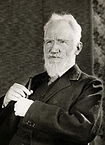“All Shaw's characters are himself: mere puppets stuck up to spout Shaw.”
-Fanny’s First Play (1911), Epilogue
 Irish playwright George Bernard Shaw is widely considered to be one of the most important dramatists of the twentieth century. His singular blend of the literary, the polemical, and the political — honed over the course of more than 20 plays — earned him a firm entrenchment in the canon as well as a Nobel Prize in Literature. On top of being a great literary force, Shaw is also considered to be one of the English-speaking world’s greatest wits. And while some of his well known witticisms may have been misattributed (it was, for instance, Oscar Wilde who actually declared Great Britain and the United States to be ‘separated by a common language’), his skill with clever language and witty repartee is undeniable.
Irish playwright George Bernard Shaw is widely considered to be one of the most important dramatists of the twentieth century. His singular blend of the literary, the polemical, and the political — honed over the course of more than 20 plays — earned him a firm entrenchment in the canon as well as a Nobel Prize in Literature. On top of being a great literary force, Shaw is also considered to be one of the English-speaking world’s greatest wits. And while some of his well known witticisms may have been misattributed (it was, for instance, Oscar Wilde who actually declared Great Britain and the United States to be ‘separated by a common language’), his skill with clever language and witty repartee is undeniable.
Only Shaw, after all, could have noted, “Patriotism is, fundamentally, a conviction that a particular country is the best in the world because you were born in it,” or “No public man in these islands ever believes that the Bible means what it says: he is always convinced that it says what he means.”
A deeply political writer, Shaw never shied away from training his wit on what he saw as the political hypocrisy and inadequacy of his time. “My specialty,” he remarked in You Never Can Tell (1899), “is being right when other people are wrong.” Naturally, Shaw didn’t shy away from that specialty. “A government,” he notes in Everyone’s Political What’s What (1944), “which robs Peter to pay Paul can always depend on the support of Paul.” In response to the general frustration that accompanied life in England, he wrote The Apple Cart (1928), which features the exclamation, “God help England if she had no Scots to think for her!”
Far from having a one-track mind, of course, Shaw was just as eager to turn his biting wit to the world of art and beyond. On the possibility for clear discourse in either art or politics, he said, “The single biggest problem in communication is the illusion that it has taken place.” He further noted, “consistency is the enemy of enterprise, just as symmetry is the enemy of art.” Perhaps most fittingly for his own work, he once made a point of asserting, “the secret of success is to offend the greatest number of people.”
 Just as art and politics went un-spared, so too were domestic life, stupidity, and love given the Shaw treatment. In Mrs. Warren’s Profession (1902), he quips, “There are no secrets better kept than the secrets everybody guesses.” In Caesar and Cleopatra (1906), he notes, “when a stupid man is doing something he is ashamed of, he always declares that it is his duty.” And in Man and Superman (1903), he remarks in Wildean fashion, “There are two tragedies in life. One is not to get your heart's desire. The other is to get it.”
Just as art and politics went un-spared, so too were domestic life, stupidity, and love given the Shaw treatment. In Mrs. Warren’s Profession (1902), he quips, “There are no secrets better kept than the secrets everybody guesses.” In Caesar and Cleopatra (1906), he notes, “when a stupid man is doing something he is ashamed of, he always declares that it is his duty.” And in Man and Superman (1903), he remarks in Wildean fashion, “There are two tragedies in life. One is not to get your heart's desire. The other is to get it.”
Taken together, these quotes amount to more than just the collected witticism of a clever playwright. Rather, they represent the outer-working of a uniquely distinguished mind, inimitable in the world of 20th Century letters.









